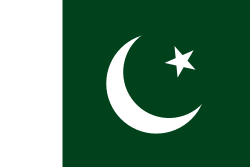| Paramilitary forces of Pakistan | |
|---|---|
 Flag of Pakistan | |
| Active | Varies by force |
| Country | Pakistan |
| Allegiance | Government of Pakistan |
| Branch | Ministry of Interior (primarily), Pakistan Armed Forces (support role) |
| Type | Paramilitary forces |
| Role | Internal security, border security, law enforcement, counter-insurgency |
| Part of | Ministry of Interior (primarily), Pakistan Armed Forces (support role) |
| Garrison/HQ | Various locations (national deployment) |
| Motto | Varies by force |
The paramilitary forces of Pakistan operate alongside the regular military and police forces to maintain internal security, border security, and law enforcement. These forces are generally administered by the Ministry of Interior, although several units operate in coordination with the Pakistan Armed Forces. The term paramilitary forces of Pakistan commonly refers to the following organizations:
- Civil Armed Forces
- Airports Security Force
- Pakistan Maritime Security Agency
- Anti Narcotics Force
- National Guard
- Mujahid Force
- Janbaz Force
- National Cadet Corps (Pakistan) (disbanded)
- Women's Guard (disbanded)
- Pakistan Levies (split and localized)
| Name | Status | Operates under | Headquarters | Primary Roles |
|---|---|---|---|---|
| Punjab Rangers | Active | Ministry of Interior | Lahore | Border security (India), counter-insurgency, law & order enforcement anti-crime and riot control in Punjab. |
| Sindh Rangers | Active | Ministry of Interior | Karachi | Border security (India), counter-insurgency, law & order enforcement anti-crime and riot control in Sindh. |
| Frontier Corps Khyber Pakhtunkhwa (North) | Active | Ministry of Interior (supports Pakistan Army) | Peshawar | Border security (Afghanistan), counter-insurgency, law & order enforcement anti-crime and riot control in Northern KPK. |
| Frontier Corps Khyber Pakhtunkhwa (South) | Active | Ministry of Interior (supports Pakistan Army) | Dera Ismail Khan | Border security (Afghanistan), counter-insurgency, law & order enforcement anti-crime and riot control in Southern KPK. |
| Frontier Corps Balochistan (North) | Active | Ministry of Interior (supports Pakistan Army) | Quetta | Border security (Afghanistan), counter-insurgency, law & order enforcement anti-crime and riot control in Northern Balochistan. |
| Frontier Corps Balochistan (South) | Active | Ministry of Interior (supports Pakistan Army) | Turbat | Border security (Iran), counter-insurgency, law & order enforcement anti-crime and riot control in Southern Balochistan. |
| Federal Constabulary | Active | Ministry of Interior | Peshawar | Maintaining law and order, and dealing with situations beyond the capabilities of the police, guarding against tribal incursions, criminal gangs, and contraband smuggling. |
| Pakistan Coast Guards | Active | Ministry of Interior (supports PAF and CAF) | Karachi | Coastal security, anti-smuggling, anti-human-trafficking patrolling Arabian Sea coastline. |
| Gilgit-Baltistan Scouts | Active | Ministry of Interior | Gilgit | Internal security, border patrolling and law enforcement in Gilgit-Baltistan. |
| Airports Security Force | Active | Ministry of Aviation | Karachi | Aviation security and protection of airports and aircraft. |
| Pakistan Maritime Security Agency | Active | Ministry of Defence | Karachi | Maritime law enforcement and protection of Pakistan's sea borders. |
| Anti Narcotics Force | Active | Ministry of Narcotics Control | Rawalpindi | Combating drug trafficking and enforcing anti-narcotics laws. |
| National Guard (Pakistan) | Active | Ministry of Defence | Various | Reserve paramilitary force for supporting regular army and civil defence. |
| Mujahid Force | Active | Ministry of Defence | Various | Army reserve component; support during emergencies. |
| Janbaz Force | Active | Ministry of Defence | Various | Volunteer reserve force; local defense and assistance in national emergencies. |
| Pakistan Levies | Split and localized | Ministry of Interior | Various | Tribal policing in rural and tribal areas (partially merged into KP Police post-2018). |
| Balochistan Levies | Active | Ministry of Interior | Quetta | Law enforcement in rural Balochistan. |
| Dir Levies | Active | Ministry of Interior | Dir | Local policing force in Dir District, KP. |
| Gilgit-Baltistan Levies Force | Active | Ministry of Interior | Gilgit | Local policing force in Gilgit-Baltistan. |
| Khyber Pakhtunkhwa Levies | Active | Ministry of Interior | Various | Regional law enforcement in KP. |
| Malakand Levies | Active | Ministry of Interior | Malakand | Local policing in Malakand Division, KP. |